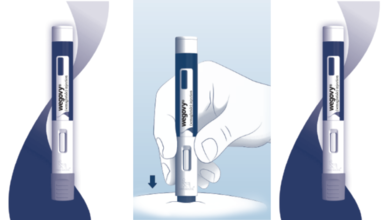- Health Conditions A-Z
- Health & Wellness
- Nutrition
- Fitness
- Health News
- Ayurveda
- Videos
- Medicine A-Z
- Parenting
Wegovy Approved For MASH Treatment With Fibrosis But No Cirrhosis

Credits: Wegovy
Wegovy has been approved by the US Food and Drug Administration (FDA) for the treatment of metabolic-associated steatohepatitis (MASH) in adults with moderate-to-advance fibrosis but without cirrhosis.
What it means is that FDA has granted approval to Novo Nordisk's once-weekly 2.4 mg semaglutide subcutaneous injection for treating a liver cell damage, formerly known as NAFLD or nonalcoholic fatty liver disease. This is a condition where excess fat builds up in the liver, unrelated to heavy alcohol use. It is characterized by fat accumulation in the liver, inflammation, and liver cell damage that could potentially lead to fibrosis and cirrhosis. It is also closely linked to metabolic disorders like obesity and type 2 diabetes, which can be treated by Wegovy. Furthermore, the condition is also closely associated with high cholesterol.
ALSO READ: How To Identify A Counterfeit Ozempic? Look For These Signs
How Was The Approval Given?
The accelerated approval was given on the basis of part-one results from an ongoing two-part, phase 3 ESSENCE trial. This is where Wegovy demonstrated a significant improvement in liver fibrosis with no worsening of steatohepatitis. It also showed a resolution of steatohepatitis with no worsening of liber fibrosis as compared with placebo at week 72. The results were also published in April in The New England Journal of Medicine.
How Was The Trial Conducted?
The trial involved a total of 800 participants, who were assigned to either Wogovy (534 participants) or placebo (266 participants) in addition to lifestyle changes. The mean age was 56 years and the mean BMI was 54. Most patients were white, which comprised of the 67.5% of the participants, 57.1% of them were women and 55.9% of them were the patients with type 2 diabetes, while 31.3% of them (around 250 patients) had stage II fibrosis and 68.8% (550 patients) had stage II fibrosis.
It was noted that the patients were on stable doses of lipid-lowering , glucose-management, and weight loss medications.
At week 72, the trial’s first primary endpoint revealed that 63% of the 534 participants receiving Wegovy achieved resolution of steatohepatitis without worsening liver fibrosis, compared to 34% of the 266 participants on placebo, a statistically significant outcome.
For the second primary endpoint, 37% of those treated with Wegovy showed improvement in liver fibrosis without worsening steatohepatitis, versus 22% in the placebo group, again demonstrating a significant difference.
What Lies Ahead For Wegovy?
Novo Nordisk has moved forward with key regulatory submissions for its obesity treatments in 2025. The company filed for approval of its therapies in the European Union in February, followed by a regulatory submission in Japan in May. That same month, the U.S. Food and Drug Administration (FDA) accepted a filing for oral semaglutide 25 mg.
Looking ahead, part 2 of the ESSENCE trial is expected to report results in 2029. The study is designed to evaluate whether Wegovy can reduce the risk of liver-related clinical events in patients with metabolic dysfunction–associated steatohepatitis (MASH) and F2 or F3 fibrosis, compared with placebo, over 240 weeks.
While Novo Nordisk has the technology to manufacture semaglutide in pill form, the company emphasized that the U.S. launch of oral semaglutide for obesity will depend on portfolio priorities and manufacturing capacity. The higher-dose 50 mg oral version has not yet been submitted to regulators.
“The oral form requires more active pharmaceutical ingredient (API),” a spokesperson told Medscape Medical News. “With a fixed amount of API, the injectable form allows us to treat more patients. We are expanding oral and injectable production capacities worldwide, but it takes time to build, validate, and scale these processes.”
AIIMS Doctor Issues Warning After Patient Follows ChatGPT Advice, Suffers Internal Bleeding

Credits: AI GENERATED
In a serious caution to the public, Dr Uma Kumar, Head of Rheumatology at AIIMS New Delhi, has warned against using AI chatbots such as ChatGPT for medical self-diagnosis. As reported by Hindustan Times, she issued the warning while speaking to the media after a recent case at the institute exposed the risks of acting on automated health advice.
The concern followed an incident in which a patient developed severe internal bleeding after treating back pain based on suggestions generated by an AI chatbot. The patient consumed non-steroidal anti-inflammatory drugs without consulting a doctor or undergoing basic medical tests.
When AI Advice Turns Dangerous
According to doctors at AIIMS, the patient relied on an AI tool to manage persistent back pain instead of seeking clinical care. The chatbot recommended commonly used painkillers, which the patient purchased and took independently.
As Hindustan Times noted, the AI system had no access to the patient’s medical history or their risk of stomach and intestinal complications. What appeared to be a routine solution resulted in a life-threatening episode of internal bleeding.
Doctors say this reflects a growing pattern, where quick online answers are replacing medical evaluation, even for drugs that are widely available over the counter.
Why Medical Diagnosis Is Not Data Matching
Dr Kumar explained that medical diagnosis follows a structured process known as diagnosis by exclusion. Doctors rule out possible causes through examinations, laboratory tests, imaging, and patient history before deciding on treatment.
An AI model, however, works by identifying patterns in data. It cannot examine a patient, detect physical warning signs, or judge whether a symptom points to a deeper problem. In this case, proper investigations would likely have revealed a high risk of bleeding, a step that was entirely bypassed.
The Risk of Confident but Incorrect Guidance
Medical experts are increasingly concerned about what are often called AI hallucinations, where chatbots present information with confidence despite gaps or inaccuracies.
While platforms such as ChatGPT include disclaimers, their tone can appear authoritative, particularly to someone in pain. As highlighted by Hindustan Times, the recommendation to use NSAIDs was not unusual in general practice, but for this patient, it proved dangerous.
Without a doctor to check for contraindications or underlying conditions, even a common suggestion can lead to serious harm.
Doctors Call for Caution and Clearer Oversight
The incident has renewed debate over how AI platforms should handle health-related queries. AIIMS doctors are urging the public to treat online tools as sources of general information rather than personal treatment guides.
Experts believe AI can assist healthcare in limited roles, such as research support or administrative tasks, but should never replace professional diagnosis or supervision.
There are also calls for stronger public awareness and clearer regulation to prevent similar incidents. Doctors continue to stress that medical judgment, built on examination and evidence, cannot be replaced by algorithms.
What Is the Nematode-Based Cancer Detection Method? Delhi HC Upholds Patent Rejection

Credits: AI GENERATED
The Delhi High Court has turned down a Japanese company’s attempt to secure a patent for a cancer detection technique that relies on nematodes, or roundworms, ruling that it falls under diagnostic processes that cannot be patented under Indian law, regardless of how novel or non-invasive it may be.
Hirotsu Bio Science approached the High Court after India’s Controller of Designs and Patents rejected its patent application in August 2023, stating that the invention did not meet the criteria laid out in the Patents Act, 1970. In a detailed 25-page judgment delivered on Saturday, Justice Tejas Karia reaffirmed Section 3(i) of the Act, which clearly bars the patenting of diagnostic methods.
What Is the Nematode-Based Cancer Detection Method?
The nematode-based cancer detection method is a research-stage technique that uses microscopic roundworms, known as nematodes, to detect the presence of cancer. These organisms possess a highly developed sense of smell, allowing them to pick up on specific chemical cues released by cancer cells in bodily samples such as urine, breath, or tissue, as per Science Direct.
Laboratory experiments have shown that certain nematodes tend to move towards samples taken from individuals with cancer while avoiding those from healthy people. The underlying idea is that cancer changes the body’s chemical profile, creating odour patterns that these worms can detect, sometimes even at an early stage.
Scientists have looked at this approach as a potentially affordable and non-invasive screening option. However, it remains a concept under study and has not yet been accepted as a reliable medical test or used in routine clinical care.
Delhi HC Upholds Patent Rejection of Nematode-Based Cancer Detection Method
At the centre of the case was a patent application titled “Cancer detection method using the sense of smell of nematode.” Nematodes, often referred to as roundworms, are among the most widespread life forms on the planet and can be found in environments ranging from soil to living organisms.
The Japanese company aimed to patent a technology based on the biological response of Caenorhabditis elegans, a species of nematode recognised for its advanced olfactory abilities.
The firm explained that its invention relies on the chemotaxis of these worms, meaning their tendency to move towards or away from certain scents, which would serve as a biological signal for the presence of cancer.
According to the company, the nematodes showed avoidance behaviour when exposed to urine from healthy individuals, while being drawn towards urine samples from cancer patients. It claimed the method demonstrated complete accuracy during testing and could detect several cancers, including gastric, colorectal, and pancreatic cancers, even at very early stages.
Is This Process Patentable in India?
The main legal question was whether the method qualified as a non-patentable “diagnostic process” under Section 3(i) of the Patents Act, 1970. This provision excludes from patent protection any process related to medicinal, surgical, curative, preventive, diagnostic, or therapeutic treatment of humans.
Hirotsu Bio Science Inc challenged the rejection by the Controller of Designs and Patents in the High Court, arguing that their invention should be seen as a “detection” method rather than a “diagnostic” one. The company maintained that the process was carried out entirely in a laboratory setting, using samples such as urine or tissue, and did not involve any direct medical procedure or clinical decision-making on the human body.
FDA Issues Live It Up Super Greens Supplement Powder Recall Over Salmonella Outbreak

Credit: Canva
Health officials have issued a recall for the Live It Up Super Greens supplement powder after 45 people across 21 states were found suffering from salmonella across the US.
The Food and Drug Administration and Centers for Disease Control and Prevention issued an official recall on January 14 for the Live it Up Original and Wild Berry Super Greens dietary supplement powder flavors.
The affected products with expiration dates from August 2026 and January 2028 have been affected by this recall and include:
- Live it Up Super Greens, NET WT 8.5 oz (240g) with UPC 860013190804.
- Live it Up Super Greens, 30 – 0.28oz (8g) sticks, NET WT. 8.47 oz (240g) with UPC 850077468063
- Live it Up Super Greens, Wild Berry, NET WT 8.5OZ (240g), with UPC 860013190811
- Live it Up Super Greens, Wild Berry, 30 – 0.32oz (9g) Sticks, NET WT. 9.52oz (270g), with UPC 850077468070
Authorities has advised consumers to not eat, sell or serve the affected Live it Up-brand products and to contact the company for returns.
Additionally, officials are asking people to wash items and surfaces that may have touched the recalled super greens supplement powders using hot soapy water or a dishwasher.
Of the 45 illnesses, 12 resulted in hospitalizations, according to the FDA. No deaths linked to the recall have been reported.
What Is Salmonella?
Salmonella, or salmonellosis, is an infection caused by the Salmonella bacteria which can invade and destroy the cells that line the intestines, resulting in low water absorption. This makes it hard for the body to absorb water, which can give you stomach pains, diarrhea and fever.Apart from this, other symptoms include:
- Fever
- Nausea
- Vomiting
- Chills
- Headache
- Blood in the stool
Most people develop symptoms within 8 to 72 hours after exposure while most healthy people recover within a few days to a week without specific treatment. However, in some cases, diarrhea can cause severe dehydration and requires prompt medical attention.
While anyone can contract salmonella, children younger than five, elderly and people with weakened immune systems are more likely to develop severe infections.
Is Salmonella Life-Threatening?
Life-threatening complications may develop if the infection spreads beyond the intestines to other organs. The risk of getting salmonella infection is higher with travel to countries without clean drinking water and proper sewage disposal.
While most people do not require medical attention for salmonella infection, those at high risk may need a health care provider if the infection lasts more than a few days, is associated with high fever or bloody stools and appears to be causing dehydration, with signs such as such as urinating less than usual, dark-colored urine as well as having a dry mouth and tongue.
© 2024 Bennett, Coleman & Company Limited

